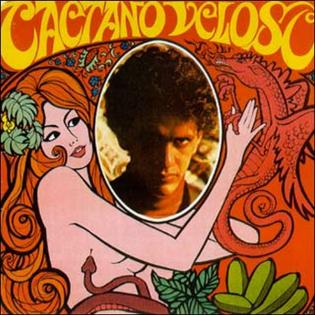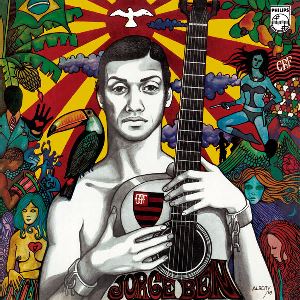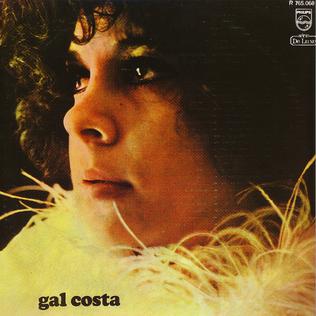
Caetano Emanuel Viana Telles Veloso is a Brazilian composer, singer, guitarist, writer, and political activist. Veloso first became known for his participation in the Brazilian musical movement Tropicalismo, which encompassed theatre, poetry and music in the 1960s, at the beginning of the Brazilian military dictatorship that took power in 1964. He has remained a constant creative influence and best-selling performing artist and composer ever since. Veloso has won nine Latin Grammy Awards and two Grammy Awards. On November 14, 2012, Veloso was honored as the Latin Recording Academy Person of the Year.

Gilberto Passos Gil Moreira, known professionally as Gilberto Gil, is a Brazilian singer, guitarist, and songwriter, known for both his musical innovation and political activism. From 2003 to 2008, he served as Brazil's Minister of Culture in the administration of President Luiz Inácio Lula da Silva. Gil's musical style incorporates an eclectic range of influences, including rock, Brazilian genres including samba, African music, and reggae.
Tropicália, also known as Tropicalismo, was a Brazilian artistic movement that arose in the late 1960s and formally ended in 1968. Though music was its chief expression, the movement was not solely expressed so, as it enveloped other art forms such as film, theatre, and poetry. Tropicália was characterized by the amalgamation of Brazilian genres—notably the union of the popular and the avant-garde, as well as the melding of Brazilian tradition and foreign traditions and styles.

Eduardo de Góes "Edu" Lobo is a Brazilian singer, guitarist, and composer.

Rita Lee Jones is a Brazilian rock singer, composer and writer. She is a former member of the Brazilian band Os Mutantes and is a popular figure in Brazilian entertainment, where she is also known for being an animal rights activist and a vegan. She has sold more than 60 million albums worldwide. Her autobiography Rita Lee: Uma Autobiografia was the best-selling non-fiction book of 2017 in Brazil.

Gal Costa is a Brazilian singer of popular music.

Maria Bethânia Viana Teles Veloso is a Brazilian singer and songwriter. Born in Santo Amaro, Bahia, she started her career in Rio de Janeiro in 1964 with the show "Opinião" ("Opinion"). Due to its popularity, with performances all over the country, and the popularity of her 1965 single "Carcará", the artist became a star in Brazil.

João Voz e Violão is a bossa nova album by João Gilberto, released in 2000. Recording very little in the 1990s, this album is Gilberto's first studio album since 1991's João. The album won the 2001 Grammy Award for Best World Music Album.
"Manhã de Carnaval" is a song by Brazilian composer Luiz Bonfá and lyricist Antônio Maria.

Roberto Menescal is a Brazilian composer, record producer, guitarist, vocalist, and pioneer of bossa nova. In many of his songs there are references to the sea, including his best-known composition "O Barquinho". He is also known for work with Carlos Lyra, Nara Leão, Wanda Sá, Ale Vanzella, and many others. Menescal has performed in Latin music genres such as Música popular brasileira, bossa nova, and samba. He was nominated for a Latin Grammy for his work with his son's bossa group Bossacucanova in 2002 and received the 2013 Latin Recording Academy Special Awards in Las Vegas in November 2013.
Celso Fonseca is a Brazilian composer, producer, guitarist and singer. He is noted as part of the Música popular brasileira since the 1980s, initially as accompanist and composer, then producer, and since the mid–1990s as an artist in his own right.

Caetano Veloso is the debut solo album by the artist of the same name, released in Brazil in 1968. He had released Domingo the year before in collaboration with Gal Costa. It was one of the first Tropicália efforts, and features arrangements by Júlio Medaglia, Damiano Cozzella, and Sandino Hohagen, as well as an eclectic assortment of influences, demonstrating the "antropofagia" of the Tropicália movement. Sounds from psychedelia, rock, pop, Indian music, bossa nova, Bahian music and other genres appear on the album. It includes the hit songs "Alegria, Alegria", "Tropicália", and "Soy loco por ti, América".

Caetano Veloso is an album released in Brazil in 1969, being the third album by Caetano Veloso, his second solo.

Caetano Veloso is the third self-titled album by Caetano Veloso. It was recorded in England, when the artist was in an exile imposed by the Brazilian government of the time for being subversive. It is mostly sung in English and portrays a sad tone throughout, reflecting his feelings about homesickness and the absence of his family and friends. It was released first in Europe, and then in Brazil, in 1971.

José Domingos de Morais, better known as Dominguinhos, was a Brazilian composer, accordionist and singer. His principal musical influences were the music of Luiz Gonzaga, Forró and in general the music of the Sertão in the Brazilian Northeast. He further developed this typical Brazilian musical style, born out of the European, African and Indian influences in north-eastern Brazil, creating a unique style of Brazilian Popular Music.
The discography of Brazilian singer Maria Bethânia consists of 34 studio albums, 15 live albums, several participations in movie and telenovela soundtracks as well as numerous collaborations with other artists.

Brazilian Dreams is a live album by Cuban jazz performer Paquito D'Rivera. It was recorded at the Manchester Craftsmen's Guild in Pittsburgh, Pennsylvania, between April 26 and 29, 2001, and released by MCG Jazz on August 27, 2002. The album features guest performances by the American vocal group New York Voices and trumpeter Claudio Roditi. In the United States, it peaked at number 22 on Billboard's Top Jazz Albums chart.

Jorge Ben is the sixth studio album by Brazilian singer-songwriter and guitarist Jorge Ben. It was released in November 1969 by Philips Records. The album was his first recording for a major label since 1965 when his first stint with Philips ended due to creative differences.

Gal Costa is the first solo album by the Brazilian singer Gal Costa, released in 1969. It was ranked the 80th best Brazilian album of all time by the Brazilian Rolling Stone magazine.

Abraçaço is an album by Brazilian singer, songwriter, and guitarist Caetano Veloso, released in 2012 on Universal Records.
















